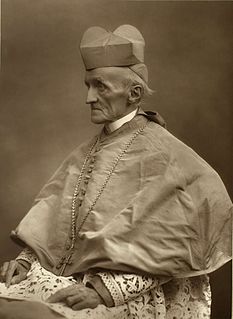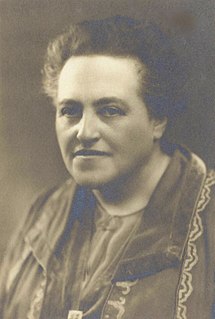A Quote by Catherine of Genoa
And when I hear it said that God is good and He will pardon us, and then see that men cease not from evil-doing, oh, how it grieves me! The infinite goodness with which God communicates with us, sinners as we are, should constantly make us love and serve Him better; but we, on the contrary, instead of seeing in his goodness an obligation to please Him, convert it into an excuse for sin which will of a certainty lead in the end to our deeper condemnation.
Quote Topics
Related Quotes
Praise consists in the love of God, in wonder at the goodness of God, in recognition of the gifts of God, in seeing God in all things He gives us, ay, and even in the things that He refuses to us; so as to see our whole life in the light of God; and seeing this, to bless Him, adore Him, and glorify Him.
I know that God loves us. He allows us to exercise our moral agency even when we misuse it. He permits us to make our own decisions. Christ cannot help us if we do not trust Him; He cannot teach us if we do not serve Him. He will not force us to do what's right, but He will show us the way only when we decide to serve Him. Certainly, for us to serve in His kingdom, Christ requires that we experience a change of thought and attitude.
God's love never ceases. Never. Though we spurn him. Ignore him. Reject him. Despise him. Disobey him. He will not change. Our evil cannot diminish his love. Our goodness cannot increase it. Our faith does not earn it any more than our stupidity jeopardizes it. God doesn't love us less if we fail or more if we succeed. God's love never ceases.
Let us pause before the Child of Bethlehem. Let us allow our hearts to be touched, let us allow ourselves to be warmed by the tenderness of God; we need his caress. God is full of love: to him be praise and glory forever! God is peace: let us ask him to help us to be peacemakers each day, in our life, in our families, in our cities and nations, in the whole world. Let us allow ourselves to be moved by God's goodness.
There are still people who insist that we have to preach on repentance. Well, I disagree! I think we should do it God’s way – preach the goodness of God and allow the goodness of God to lead people to repentance. Such repentance will be true repentance. It will not be motivated by the fear of judgment and indignation. It will be a genuine repentance that is motivated by His grace, unconditional love and compassion. After all, our ability to love God stems from our first tasting His love for us.
God made the world for the delight of human beings-- if we could see His goodness everywhere, His concern for us, His awareness of our needs: the phone call we've waited for, the ride we are offered, the letter in the mail, just the little things He does for us throughout the day. As we remember and notice His love for us, we just begin to fall in love with Him because He is so busy with us -- you just can't resist Him. I believe there's no such thing as luck in life, it's God's love, it's His.
For here we are so blind and foolish that we never seek God until he, of his goodness, shows himself to us. It is when we do see something of him by his grace that we are stirred by that same grace to seek him, and with earnest longing to see still more of his blessedness. So I saw him and sought him; I had him and wanted him. It seems to me that this is and should be an experience common to us all.
But look at the men who have those perverted notions about the grace of Jesus Christ which has come down to us, and see how contrary to the mind of God they are. . . . They even abstain from the Eucharist and from the public prayers, because they will not admit that the Eucharist is the self-same body of our Savior Jesus Christ which flesh suffered for our sins, and which the Father of His goodness raised up again.
For all its peculiarities and unevenness, the Bible has a simple story. God made man. Man rejected God. God won't give up until he wins him back. God will whisper. He will shout. He will touch and tug. He will take away our burdens; he'll even take away our blessings. If there are a thousand steps between us and him, he will take all but one. But he will leave the final one for us. The choice is ours. Please understand. His goal is not to make you happy. His goal is to make you His. His goal is not to get you what you want; it is to get you what you need.
God has no needs. Human love, as Plato teaches us, is the child of Poverty – of want or lack; it is caused by a real or supposed goal in its beloved which the lover needs and desires. But God's love, far from being caused by goodness in the object, causes all the goodness which the object has, loving it first into existence, and then into real, though derivative, lovability. God is Goodness. He can give good, but cannot need or get it. In that sense , His love is, as it were, bottomlessly selfless by very definition; it has everything to give, and nothing to receive.
A good end cannot sanctify evil means; nor must we ever do evil, that good may come of it... It is as great presumption to send our passions upon God's errands, as to palliate them with God's name... We are too ready to retailiate, rather than forgive, or gain by love and information. And yet we could hurt no man that we believe loves us. Let us try then what Love will do: for if men did once see we love them, we should soon find they would not harm us. Force may subdue, but Love gains: and he that forgives first, wins the laurel.








































